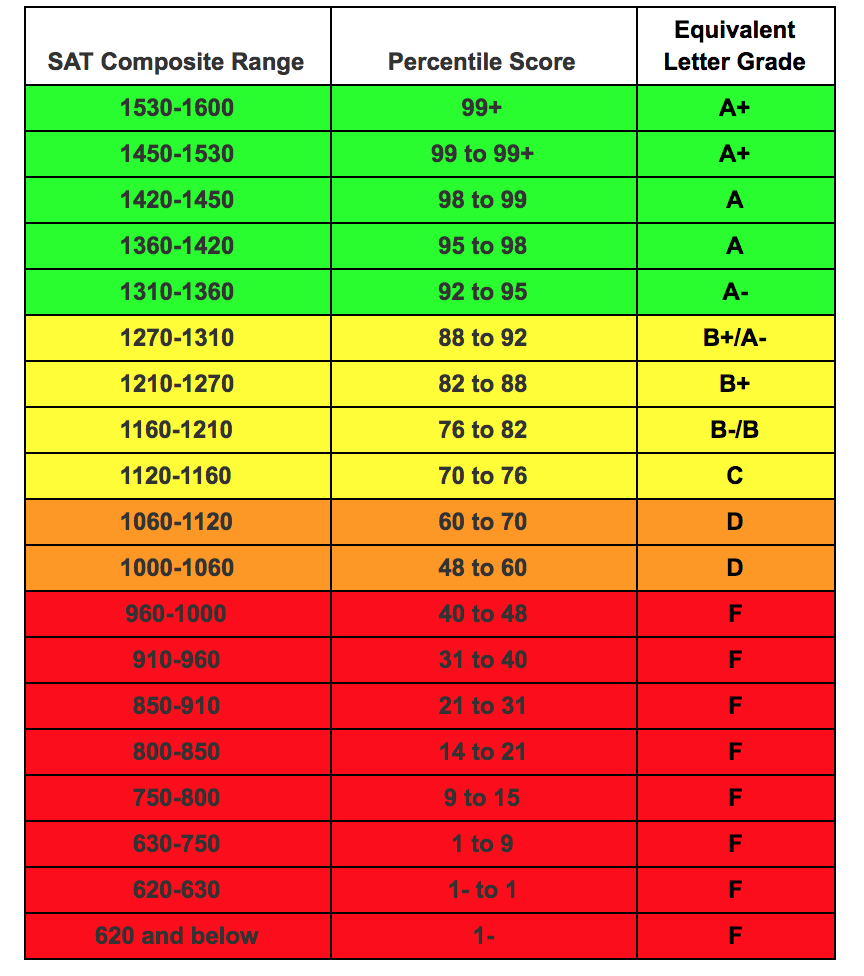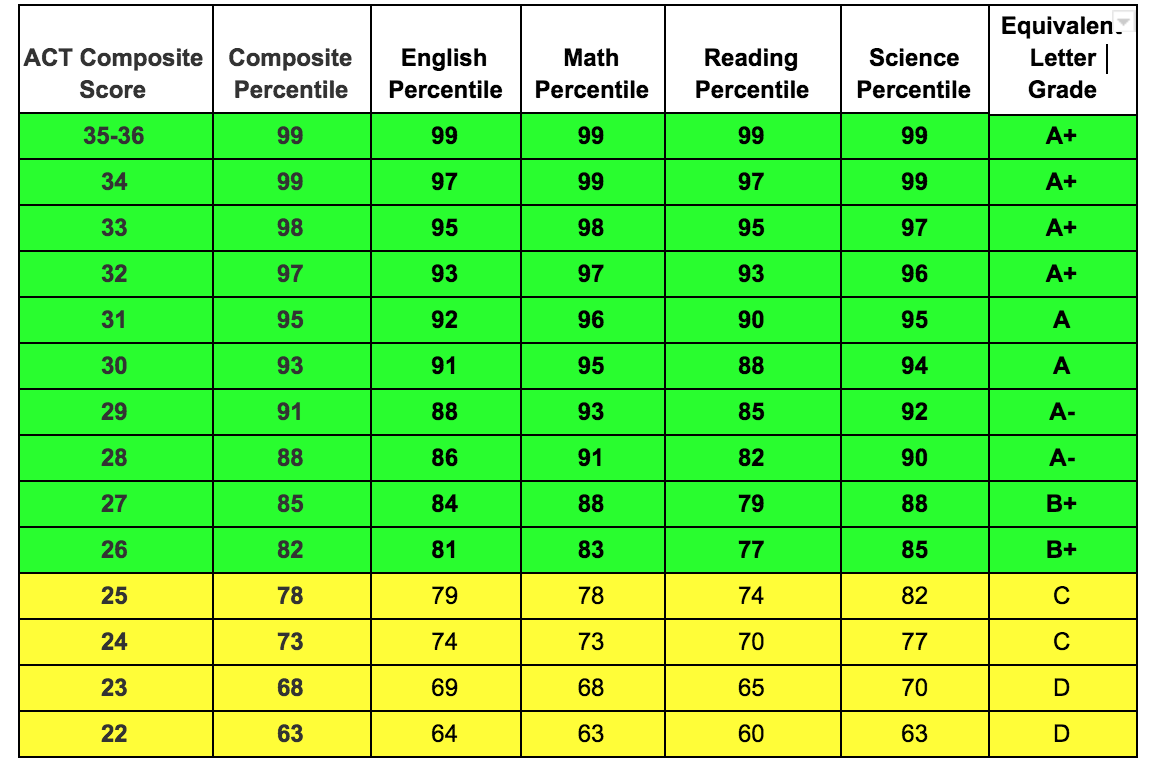What are percentiles?
People often confuse percentiles with percentages, and it's easy to get them confused! Percentages are parts of a whole (think 50/100 = 50%). Percentiles are comparisons of one item to those around it - for example, if you are in the 90th percentile, you are scoring higher than 90% of all test-takers.
How can I use percentiles to know if I did well on the ACT or SAT?
Your composite score and percentile score will both tell you a lot about where you stand in comparison to other testers. The charts below provide comparisons of composite scores, percentiles, and letter grades to give you a better perspective of what your score really means.
On the chart, find your composite score, then look to the other columns to find your percentile rank, and the equivalent letter grade to your score. Then ask yourself:
-
Does the grade line up with how you feel about the test?
-
Is the grade similar to the grades you get in English/Math/Science at school?
-
If yes, then you've done a great job and should feel good about your test scores!
-
If no, you should still feel good about your scores, because you just accomplished a great deal of work! But it's possible there are other factors standing in your way... Do tests make you nervous? Did you have enough time to complete each section? Was the length of the test unfamiliar and tiring? Have you taken a lot of standardized tests in the past?
There are ways to combat these problems, but keep in mind that not everyone is awesome at standardized tests, and this may affect your score positively or negatively, depending on your test-taking style and abilities.
How does test prep help me?
Standardized tests have that name for a reason...they are standards-based, and are uniform no matter where you take the test. This makes your academic abilities measurable and comparable to other students in the nation. But this does not mean that the test box fits everyone, nor does it mean that everyone should fit into that box. By working with a test prep tutor, you will learn strategies that are specific to each test, and you will become familiar with the styles of questions asked on each test, the pacing for each section, and you will build your test-taking stamina.
For SAT prep specifically, our past students have seen an average of about 50-100 points, but each student's growth depends on their starting score and how much time, effort, and natural abilities they bring to the test. For a student who is starting at a higher score, our first goal would be to get a 1400+ on the SAT, and then push for the highest possible score.
For ACT prep, our past students have seen 2-7 points of growth, but again, starting scores, dedicated time and effort, and natural abilities all play a part in how much traction a student sees in raising their final composite score.
It's hard to predict how students will do on the actual test because the majority of score improvement is dependent on a student's present academic foundation, natural capabilities, motivation, and availability/time. After that it is our responsibility to provide excellent test prep tutoring, curriculum, lessons, and materials. The responsibility to improve test scores lies 70% with the student and 30% with the tutor.
Why take practice tests?
At Pivot, we use weekly practice tests to keep track of student progress and improvement - to measure how much you are growing. The practice tests are our predictors of how students will do on their big test day, and they help us fine-tune our tutoring to identify each student's specific strengths and weaknesses. Typically, a student's final practice test will reflect the score they should receive on the actual test.
What if I have a really high score? Do I still need prep?
Once you reach the 32+ range, you've made it to the 96th percentile - which is outstanding! From a test prep perspective, there is not much more that can be done unless you are scoring much lower on one section of the test.
Why are percentiles important?
Colleges use percentiles to compare you to other students. Percentiles allow admissions counselors to compare you not only with students who are coming from the same community/city/state as you, but on a national scale too. Knowing your numbers in advance can help you determine which colleges are right for you (and which you are a competitive candidate for).
SAT Composite/Percentile Chart
Here you can see the comparison between a range of SAT composite scores, the percentile these score ranges fall into, and the equivalent letter grade for each score range. Remember that these percentiles include the whole nation of SAT test-takers, so if you are above the 70th percentile, you are scoring higher than 70% of testers in the nation!
For the SAT, as well as the ACT, there is the most movement within the middle scores/percentiles. Moving from a 1100 to a 1200 takes you from the 60th percentile to the 80th!
Using this measure is particularly useful on the SAT, where the composite range is less familiar and feels less measurable, especially since the top scores/percentile rankings have a score differential of 300 points. (1300-1600 are all above the 90th percentile).

SAT PERCENTILE AND EQUIVALENT LETTER GRADE SCORE COMPARISONS SOURCE: COLLEGE BOARD
ACT Composite/Percentile Chart
Now here is a similar chart for the ACT - notice that it includes the percentile breakdown for each section of the test. It is interesting to see how the changes in percentiles measure up with the change in composite scores - not every section has the same level of difficulty, and the number of questions helps move the English and Math percentiles up and down more quickly.
There is the most movement between percentiles in the middle scores (20-30). This means that if you are scoring in the low 20s, you have a great chance of jumping up in the percentiles if you raise your score even by 2-3 points. If you move from a 22 to a 26, you move from the 63rd to the 82nd percentile. That's a huge difference for a score increase that is very achievable! Similarly, if you more from a 27 to a 29, you are suddenly above the 90th percentile, which puts you in the top 10 percent of students in the nation - a very competitive position to be in!


ACT PERCENTILE AND EQUIVALENT LETTER GRADE SCORE COMPARISONS SOURCE: ACT
Within the top scores (above a 32), there is very little difference between the percentile rankings, which means that unless you require a higher composite to apply to your desired schools, you don't really need to retake the test.
Remember these questions again - does your score on this test reflect what you have learned at school? Do your grades give you an accurate prediction of how you performed on the ACT or SAT? This should help you determine whether or not you need tutoring, or if you want to take the test again.
